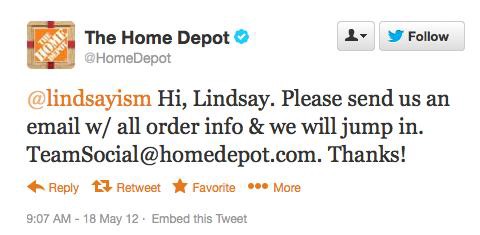Why You Should Not Use Twitter For Corporate Customer Service: A Cautionary Tale
Why You Should Not Use Twitter For Corporate Customer Service: A Cautionary Tale
by Lindsay Robertson
Last spring, my first in a new apartment, I was careful to order my air conditioner way ahead of the first heat wave. I picked out a window unit from Home Depot online and scheduled delivery for a Friday in mid-May that I’d chosen as a spring-cleaning vacation day.
That morning, I woke up and looked up my order online, only to see that it had been suddenly (I’d checked the day before) back ordered and wasn’t coming for nearly two weeks. I was furious! I would not be one of those people who didn’t have an air conditioner when it got hot outside! I had done everything right, and I deserved my air conditioner. This wrong needed to be righted.
So I did something I hadn’t tried before but that I’d been advised by friends and the internet to do in such a situation in such times as these: I addressed my grievance directly to the company on Twitter.

After all, nobody who was following me could even see it unless they happened to also be following @HomeDepot, and why would anyone do that? As far as unfortunate displays of entitlement went, it was the perfect crime. They wrote back right away.

Wow, it worked, I thought, and work it did. An extremely polite and apologetic Home Depot rep at their headquarters called me throughout the day to update me on every tiny step in the Search For A Comparable Air Conditioner in the Tri-State Area For The Honorable Super-Special Miss Robertson. Finally, they located one, way out in the furthest-from-me reaches of Queens, and asked if they could deliver it later that night.
Close to 11 p.m., the buzzer rang, and I went downstairs to let in not the burly delivery guys I was expecting, but an older man and a petite middle-aged woman, who struggled to carry the heavy 8,000 BTU unit together up one flight of stairs. Shocked, I quickly figured the story out: these visibly exhausted people were store managers, who had already worked all day and had nothing to do with the company’s online error. And I was the reason they had to drive from Queens to south Brooklyn in Friday night traffic for this errand instead of being home with their kids. I thanked them profusely and awkwardly handed the woman the $20 I had in my pocket as a tip, and they left.
I closed the door and ran to my front window and looked down at the street as the two co-workers got back into the car, which was a regular car, not a Home Depot truck. It was clearly the personal car of one of them. It had New Jersey plates. They still had a long way to go before they got home that night.
I burst into tears.
That night I got ready for bed in the shadow of a huge box representing the Pyrrhic victory of my social media experiment. I felt everything one might feel after completing the exact opposite of a random act of kindness. It’s true that, had I known I would ruin someone’s day, I would have gone through the usual channels and ended up waiting for my air conditioner the way we all did before social media. But that’s not the way it worked out.
So, yeah: the lesson is to think really carefully before doing something like that. That includes using Twitter to jump the line when your flight is canceled for weather reasons, as I saw a friend with a huge number of followers do a few weeks after my own Twitter disaster. I wanted to tell him what I’d learned: it’s just not worth it. Wait your turn, like everybody else, like we all learned in elementary school. It’s much more satisfying in the end.
Unless the corporation you’re going after is Time Warner Cable, in which case you should use every tool available to you to take those f-ing mobsters down.
Also by this author: How Not To Die Of Rabies! A Chat With Bill Wasik And Monica Murphy
Lindsay Robertson Tweets about her hatred of clutch purses here. Thumbnail photo by Rupert Ganzer.
